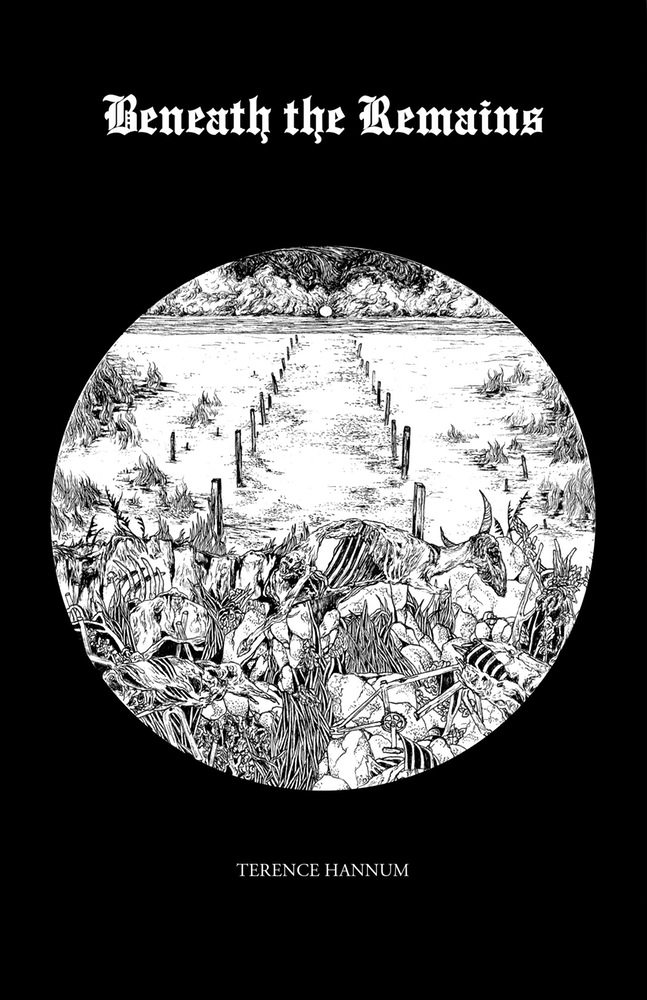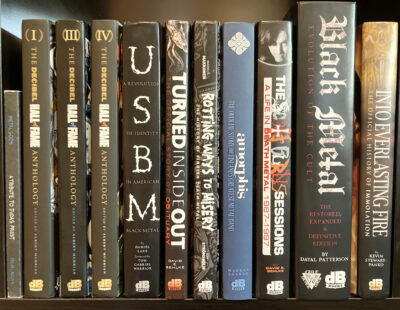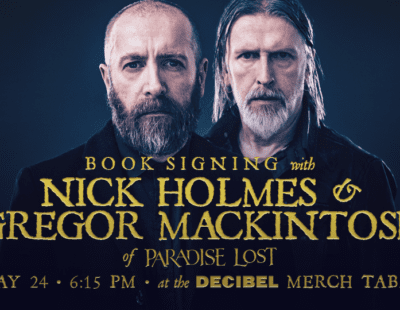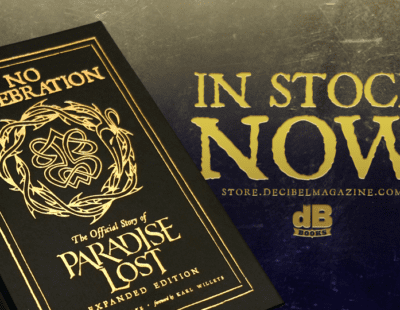
Terence Hannum is one of underground music’s renaissance men. When he isn’t busy with his day job as a college professor he plays with the cerebral metal band Locrian, paints and dabbles as an art critic. His latest venture was years in the making: a coming of age novella Beneath The Remains that explores both what it means to be a teenage boy in America and the timeless outsider appeal of death metal music. Hannum started the novel roughly five years ago and it was finally published several months ago by Anathemata Editions. The book has earned critical praise from several outlets, including the Baltimore City Paper. Hannum talked to Decibel about his book and the lack of relatable metal fans in fiction and film.
Have you always dabbled as a writer?
Well I got my MFA in Painting but really didn’t focus much on writing fiction. I was a big fan. So, nothing serious until maybe after grad school in Chicago where I started writing art criticism. For the last ten or so years I’ve written art reviews and criticism for different sites and magazines. It kind of helped me overcome some fears about writing, and left this big question mark for me about writing fiction.
What authors influenced or moved you?
I have a few people I come back to that form my foundation; Ambrose Bierce, Margaret Atwood, Jorge Luis Borges, Herman Melville and JG Ballard. They’re probably the people who taught me the most. Both Borges and Bierce really showed me that your stories can be short and that you can play around with time.
Specifically for Beneath the Remains I really thought of like coming-of-age novels like The Outsiders by SE Hinton or Marion Dane Bauer’s On My Honor as well as novels set in Florida like Zora Neale Hurston’s Their Eyes Were Watching God or Carl Hiaasen’s Tourist Season.
How did your work as musician bleed into your work as a writer?
I think it has made me feel a bit more confident, playing music taught me that your ideas and abilities can develop over time. I think of that with Locrian, that how we started as a duo over ten years ago to now being a trio. Originally we were all improvisational in intent which has shifted to something more structured and kind of influenced by prog-rock. I think this has perhaps influenced me the most by being able to form larger concept albums, and tell stories in concept records like Infinite Dissolution or Return to Annihilation. So for writing I think being flexible, listening a lot, returning to old stories and being able to respond to editors, critics. You get a thicker skin and know that you’ll get better at it.
That said, being a musician is also incredibly different from writing. In so many ways listening to music can be very passive. You can do something else while you listen and still effectively listen. It’s kind of hard to read and multitask. Also playing music live you have the immediate audience response, it’s really different from writing where you’re lucky if you hear what someone thought about what you wrote.
Between your music, career and family how did you find time to work on Beneath The Remains?
I just had modest goals over a long period of time. And once the story was told to my satisfaction I just had a ton of people read it and be honest with me. I never took it personally. I just distanced myself from the work and knew it can only get better. I tried to just spend time fixing and tidying it up. It was very gradual and I just wanted to know if it is worth publishing. I was just waiting for a friend to say something like; this is a terrible idea. But no one did.
But you’re right between my family and my job as a professor, being in Locrian and The Holy Circle, making and exhibiting my own art – why add one more thing? I often ask myself this question quite often.
When did you decide to start the novella or did it comes as a result of just working on your writing?
A bit over five years ago I had this strange dream and I couldn’t forget it. I kept telling my wife about it and she told me to write it down. So I just kept adding to it and piecing together this dream, so it would be scenes but disconnected and then I started connecting the scenes and the arc of the mystery. I realized later my dream was inspired by the death of one of my old friends and the disappearance of one of one of my best friends from when I was 12. This inspired me to include this kind of gradually increasing dream state for Galen too that buttresses the story and reveals his fear about his brother’s disappearance. Often times dreams can tell us more about ourselves and our current time.
I probably finished Beneath the Remains maybe three years ago, then it was a good year of editing to where I felt it would be ready, then essentially years of submitting and rejection.
Did you always know metal was going to be a central component of the book or did that develop as you wrote it?
Absolutely. I think it just fit with the time frame and helps as a literary device. I’ve often thought of how death metal could somehow strengthen your ability to confront death. That it gets to this transgressive place, where you revel in it but it really makes you confront fear. So I wanted the music early on to be a device in the novella, to kind of voice the dissatisfaction of the characters but also as this secret thing, these codes like Spencer’s appreciation of horror films. Once you’ve confronted death, even if it is simulated, it kind of loses its power. Even if it is just gory lyrics.
As you were writing, were there any albums in particular you listened to?
Sepultura’s Beneath the Remains was a big one, it gave the novella the title and was a turning point for the character Spencer. I think there are these stages where you see him go deeper and deeper into metal and have a lot of disdain for what everyone around him was interested in as well as the metal he leaves behind. I think that as an album, it is obviously a classic and a turning point for many metal fans, but it also is really this record about dissatisfaction with the world as it is.
Obituary’s Cause of Death gets featured in a scene and was really important. Especially since Beneath the Remains takes place in Florida. This will probably sound weird but I think that Obituary record is like this lonely masterpiece, just that guitar tone and the production. It’s really sad. In a good way. So in one scene it kind of backdrops this late night brother to brother talk on the destroyed lanai to the abandoned house they take over as the Satan House. It’s a good record to listen to late at night.
Cannibal Corpse’s Butchered at Birth was another album, I mean the first chapter has a flashback where Spencer plays the tape and screams the lyrics. This is again to show that Spencer was pushing further and trying to find something to him that felt true and extreme – to him. Death’s Leprosy has a special place in the end of the novella as well after Spencer goes missing. Oh, the odd ones out are like Big Black’s Songs About Fucking and watching like weird videos of the Geto Boys and Mr. Big on MTV.
Why did you choose Florida in the 1990s out of all the places with historic metal scenes? Did the setting just give itself to story? Do you have any familiarity with the state?
Like these two brothers I was moved to Southwest Florida from Virginia around their age and it really left an impression on me, both the landscape and the people. I think Florida is such a character itself. At that time in the early 1990s too, it was like every northeasterner or Midwesterner looking to reinvent themselves moved there. So it’s like all these people with no roots, no connections, just kind of aimlessly redefining their lives – for better or for worse. I think that turmoil really sets the characters in motion, especially for a teenager who already feels the world is a bit out of their control. To then be moved by a parent is incredibly traumatic.
The Tampa scene was honestly much more mythological in the novella. These brothers are like a few hours away but it feels like another – somewhat better – planet. I didn’t want to fictionalize what was happening there, or have it be this close read of real events, but more take it as this ideal for Spencer, something he knows because he’s observant and reads where records are recorded. He reads magazines, he gets it. But Tampa is like Mount Olympus or whatever, it’s these gods who make these albums that reveal certain truths to him and only him.
Did you do any research to make sure you got the details right about the Florida scene and the state?
Yes and no. Again I wanted to write fiction, so I know there is a strange timeline that sometimes becomes clear and other times gets obscured because I wanted a song to have an effect. However I would research maps of land developments to the fine print of liner notes. I had very specific places in mind, I would try and visit them when I would visit my parents in Florida. Or driving around I would be reminded of something that should be in the novella. Sometimes it was just because I wanted a certain smell, like rotten mango mingling with old skunk spray, or like to think about how canals ran parallel to some streets. I sometimes would be deep into what certain plants are and leaves and all this detail, but I felt it was getting in the way of the story. I think it was a good lesson, how much detail do you need? I don’t want to write like Alain Robbe-Grillet. But I still want to convey how strange, tragic and beautiful Florida is.
What is the challenge about writing about metal fans? Is it that so many media representations of them have been cliched?
I think there are certainly strange representations of the metal fan, it’s maybe changing now or totally changed now. But, I think that at that time in the early 1990s you kind of were staking a claim that was a bit riskier then than it is now, I mean it was in the wake of the Satanic Panic. So I still remember being told not to listen to certain bands and then using that admonition to pick up a tape at the record store or ordering it from a distro.
Also, that even if hundreds of thousands of people were fans of a band – in your small town you really could feel alone and isolated. The challenge with writing Beneath the Remains was really trying to balance that metal was this outlet for Spencer, it helped him not feel so alone, with that metal also gave him power, it also helped shore up being an outsider – like he knew what he liked was different from most of his classmates – which he both reveled in and despised. I think I wanted to confront some of the clichés and challenge them.
Did you pattern death metal loving brother Spencer on any experiences you had as a young death metal fan?
Absolutely, I think a lot of my friends and the initial people who turned me on to death metal were incredibly intelligent people who a lot of society had really written off. They had intelligence about books or electronics, or records, just this depth that I didn’t know. I know I am romanticizing it a bit, but I pulled a lot from my friends who I grew up with who were super smart but somehow got written off in school or by their families.
Personally, on one occasion when I got to high school I had this terrible meeting with a guidance counselor who told me I wasn’t college material. Probably because of my friends or whatever. I don’t know if she was saying that to kind of reverse psychology me but it got me pretty angry. I did put some of that into Beneath the Remains, and is somewhat ironic now because I am a college professor now.






